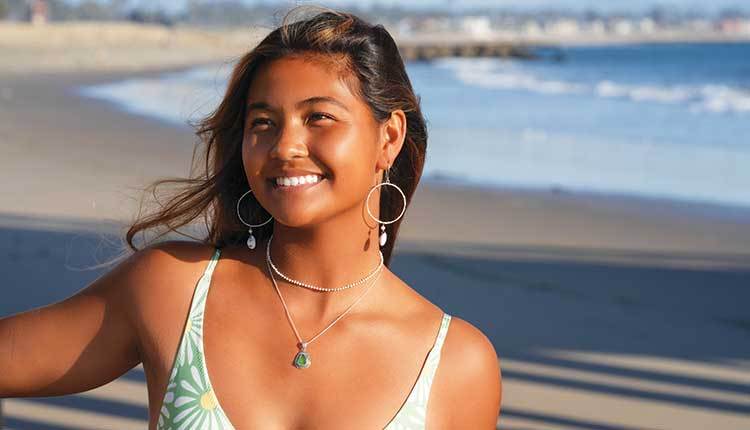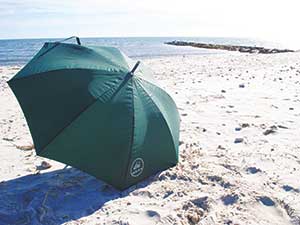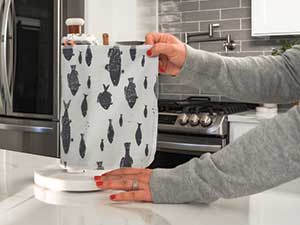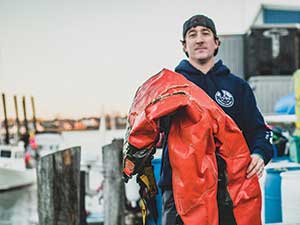
It’s not always enough anymore to offer products that only provide fashion and function. A growing number of consumers are also interested in the impact their purchases have on the environment.
According to recent research published by the National Retail Federation, between half to two-thirds of consumers will pay more for sustainable products. That percentage rises to 80% for consumers between ages 18 to 34. And for seaside retailers whose core customers are beach lovers and ocean enthusiasts, that number is arguably greater.
“We’re currently at an interesting tipping point where if you aren’t incorporating eco-friendly or socially driven brands into your store or product line, you’re at a bit of a disadvantage,” says Deirdre Horan Bird, CEO and founder of Dri, a company that makes eco-friendly umbrellas. “This industry is massive, and only going to become more prevalent.”
She adds that retailers are in the unique position to be able to amplify the causes they care about, purely by carrying products in their stores that support those causes.
“What retailers offer on their shelves is a direct reflection of who they are, not only as a business owner, but a fellow citizen of our planet. Carrying products like Dri gives retailers the opportunity to display their values, and patrons who share those morals will undoubtedly become loyal customers.”
Dri’s line of durable, chic and eco-friendly rain umbrellas are built from 100% recycled ocean-bound plastic. Each canopy equates to eight plastic bottles diverted from entering our seas, notes Horan Bird. The shaft of the umbrellas is made from stainless steel and the handles are made from sustainable bamboo.
“Bamboo is the most regenerative land plant in the world, so our handles offer another element of sustainability into the product,” Horan Bird says.
The umbrellas are available in three unisex ocean-themed colors: marine green, arctic gray, and pacific blue. There’s also a sea turtle pattern, Shelly the Sea Turtle, which is the company’s best seller.
And umbrellas are just the tip of the iceberg when it comes to eco-friendly products seaside retailers can consider offering.
Jewelry, toys, apparel, accessories, souvenir and decor are among the popular categories that have eco-friendly options. Seaside Retailer has identified just some of the many sustainable products that seaside retailers can consider carrying in their stores to help elevate their eco-friendly offerings to eco-conscious customers.
A sparkling reputation
Sea glass has often been a part of a seaside retailer’s collection of jewelry, and now there’s another type of glass jewelry gaining traction.
Kathleen Plate has been transforming empty glass bottles into beautiful jewelry pieces for almost 30 years using techniques she’s developed and even patented.

Her Smart Glass Jewelry is an entire line of fashion jewelry made from salvaged post-consumer beverage bottles.
“We gather empty bottles from bars and restaurants and friends and dumpsters and transform the glass into beautiful seaglass style jewelry,” Plate explains. “We are seaglass without the ocean.”
According to Plate, seasides and sustainability go hand in hand. “The ocean is one of the places people love, and it’s an easy entry point for them to practice recycling and being mindful of their impact on the earth. Also because our jewelry is made from the same glass as seaglass, it is a natural fit both in look and origin story.”
Zatara Bartoni’s Net & Hand jewelry is a pioneering, patented concept of using reclaimed commercial fishing net to create structures that become a blank canvas to create sustainable, eco friendly jewelry.
“Nothing compares to the joy of doing something good for the planet, and designing with reclaimed net gives us the opportunity to prevent ‘ghost net’ and help protect marine life and preserve crucial habitats,” says Monica Willard who designs the pieces with her mother Korleen Cochran.
“Zatara Bartoni’s heart is in designing for boutiques, with a range from fun to one-of-a-kind statement pieces, however, our soul is in Net & Hand, our fast growing and popular collection of primarily bracelets in the $20-$30 dollar range,” says Willard. “We like to say this is ‘When Turtles Fly’ not only because the bracelets fly off the shelves, but they help prevent turtles from becoming entangled in cast off net.”
Williard says she and her mother have truly been blown away by the emotional and passionate response customers have to the Net & Hand bracelets.
“People like to take pride in wearing unique, environmentally friendly products that are also conversation starters about issues they care about,” she says.
According to Willard, making sure people are educated about proper handling and disposal of fishing gear is a big deal in Florida.
“So many needless entanglements, especially of pelicans and other birds, could be prevented if people were more careful with their gear. That’s one reason we wanted the Net & Hand bracelets to be made of actual net — so they would be a visual reminder for people to make great choices for the environment.”
More than materials
Betty Belts creates upcycled surfboard resin jewelry and sea glass jewelry. According to Donna von Hoesslin Pu’u, founder and designer, “Sustainability is about more than just the materials and production, design is important, too. We make a point of creating styles that last for many years but also stay relevant among a sea of products that either fall apart or go out of style too quickly.”
Von Hoesslin Pu’u notes that the company is both a Green America Certified Business and a member of 1% for the Planet.
All of Pampeana’s products are eco-friendly, according to Account Manager David Kainoa. “All of our products are made from recycled glass, wood or tagua which is a nut from a palm tree in the Amazon rainforest that becomes petrified when dried.”
The company’s range of offerings include: souvenir, bed and bath, ornaments, kids home decor and fashion.
“Eco-friendly products are definitely on the rise,” Kainoa notes. “Consumers are showing increased interest in products that are produced sustainably.”
Marley’s Monsters provides sustainable solutions for every area of your life and home without compromising style or durability, according to Sarah Dooley, founder and president. She says the company’s sole purpose is to empower sustainable living, one simple swap at a time.
From your kitchen, to your bathroom, and beyond the walls of your home, we provide sustainable reusables that replace everyday, single-use products. Start your morning with reusable coffee filters, wipe up spills with UNpaper towels and clean with a washable duster.”
The products are available in a large variety of prints and colors to encourage sustainable living that promotes someone’s unique personality and style, notes Dooley.
“Our UNpaper Towels work just like a paper towel, only better. Washable and reusable, they naturally cling to themselves and can be rolled and dispensed like a paper towel,” explains Dooley.
From bibs to bags
Every product in Rugged Seas’ bag line, which ranges from clutch to tote to backpack, features recycled material from fishermen’s bibs.
According to Nikki and Taylor Strout, owners and co-founders, the bibs have gone to sea for one job and now are repurposed for another.
Gear is collected from across the country and in some instances, from around the world through collection sites or direct shipping.
From there, the gear is cleaned and worked into the upcycled bags which come in vibrant colors with the bright orange bib material making up the handles, bottom or accents.
“Eco-friendly gear in any regards is extremely important not only for recycling efforts but for telling the story and connecting people to brands trying to make a difference,” says Taylor Strout. “I think when people can see a product is clearly eco-friendly by the materials used, it helps motivate them to do more.”
Nikki Strout adds, “The visual of seeing all the different color fishing bibs triggers the mind to wonder where or who wore them before being turned into a product.”
Planet-safe play
Even toys and games can be safe for the environment.

ArtVenture carries over 200 products from small fidgets to larger models, historical and mystical vehicles, famous monuments, Da Vinci models, games and toys.
“All our models are made of eco-friendly plywood. In addition, our range ARTOYA is fully recyclable and biodegradable and made of wood from well-managed forests: both product and packaging are recyclable and no plastic is included.
The company is also a 1% for the Planet member and gives back a minimum of 1% to several nonprofits to support sustainable initiatives locally and globally.
Madd Capp’s jigsaw puzzles, cribbage sets and playing cards are also environmentally friendly, from the products to the packaging.
Products are made with recycled materials and vegetable-based inks and product packaging is sourced from FSC-certified forests.
Madd Capp’s jigsaw puzzles are packed in biodegradable and compostable bags made of cornstarch, a renewable plant material.
“As a company and as consumers ourselves, we wanted to reduce our environmental impact,” says John Moran, co-founder and principal, Madd Capp Games & Puzzles. “Changing from polybags to biodegradable and compostable bags to package our puzzle pieces just made sense. No surprise — it made sense to our buyers too. Consumers really do care about environmentally sustainable products. When presented with eco-friendly options, they’ll pick them.”
Every plush in Wild Republic’s catalog has recyclable filling. The Independence, Ohio-based company also offers 100% recycled and biodegradable options for the ultimate eco-friendly friend.
“We are using recyclable fill from plastic water bottles along with limiting all harmful material and single-use plastics from our factories,” says Trevor Faber, marketing coordinator. “From plastic beads to glass beads, and plastic eyes to stitched eyes, we are keeping our promise to the planet.”
Faber says lately, he is seeing sustainability become a priority over price point. “Many people would rather spend an extra dollar knowing they are helping the environment.”
The RGU Group is in the process of rolling out an eco-friendly product line for the first time in several years, according to Connor Atkins, marketing representative for RGU.
“Back in the late 2000s/early 2010s, we released our first line of eco-friendly teddies, which were sustainably made from bamboo instead of synthetic materials. With today’s plastic problem that has become impossible to ignore, we decided it was time to act again and introduce a line of 100% recycled souvenir teddies.”
Designed at a new, larger 10-inch sitting height, these graffiti-inspired recycled teddies will be arriving in May in their first nine locations.
“We’re committed to becoming a more earth-friendly supplier of plush toys — one recycled teddy at a time,” says Atkins.
Each Graffiti Teddy is produced from 20 half-liter water bottles — the equivalent of nearly 9 tons of plastic recycled with just the company’s first two production runs, Atkins notes.
So, as you welcome visitors to your seaside store in 2024, give them ways to help preserve the place they love.
“Tourists visit seaside destinations to connect with the environment — the beach! Sand, sun, waves, carefree vibes. One of the biggest buzzkills to a seaside vacation is trash, whether it’s just unsightly or actually poses a hazard to oneself, one’s family, or wildlife,” says Atkins. “By carrying eco-friendly products, a seaside retailer can indirectly care for the very environment that drives their livelihood.”



